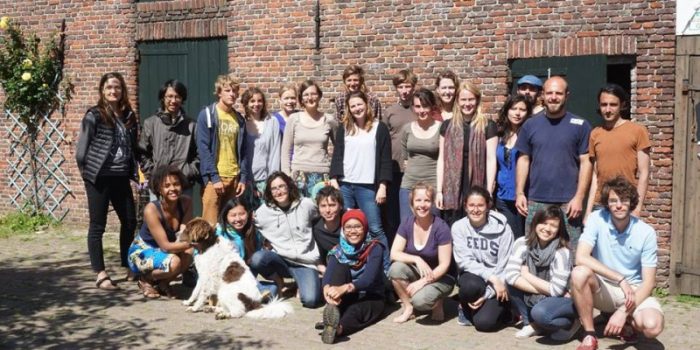FIAN, ILEIA, Otherwise, TNI, Toekomstboeren and the Wageningen University Rural Sociology Chairgroup organised the training weekend ‘Activating for Food Sovereignty: from our Daily Lives to Global Change’, an inspiring exchange on alternatives to our current food system.

Buitenverwachting is a small organic family near Leiden. For two days, it was the backdrop for an intensive training weekend on food sovereignty. Around 25 students and practitioners from various background signed up to learn more about agroecology and food sovereignty as alternatives to our current dominant food system.
On Saturday morning, the group is introduced to the general themes of the training weekend. After short introductions by FIAN and ILEIA on the right to food and agroecology, Martha Robbins from the Institute of Social Studies (ISS) shares her vision on food sovereignty. Coming from a farmers’ background, she tells about the struggle her family faced in Canada as a result of free trade agreements and the changing face of agriculture in favour of large scale agribusiness in her country.
After the theoretical introduction, everyone is invited to think about the options and constraints around food sovereignty in their own lives and public policy. Participants work together in groups under guidance of Jessica Duncan (Rural Sociology, WUR), initially identifying barriers and subsequently principles and practices to overcome these barriers. It results in an elaborate graphic which provides a nice basis for further discussions during the weekend.
Saturday afternoon is dedicated to on-farm activities, in which the participants gain many insights about the management of an organic farm and its animals, but also engage in practical activities such as weeding and pruning. Following the afternoon session participants enjoy a delicious meal with many locally produced ingredients, prepared by caterer Iris Brouwers. The evening programme features ‘Good Things Await’, a documentary on a Danish farmer’s biodynamic approach to agriculture and his battle against bureaucracy in his quest to preserve Danish Red dairy cattle. Sunday morning starts with an inspiring lecture by Joop de Koeijer from Zeeuwse Vlegel, on short and local food chains between consumers and farmers in the province of Zeeland. He reflects on his his agricultural career and especially all the difficulties and opportunities that he encountered in the development of the Zeeuwse Vlegel, a local food chain dedicated to sustainable grain production and its use by local bakeries.
In the role play ‘What is your right to food?’, participants are divided in pairs and assigned a role related to agricultural production. Each pair, representing agribusiness, government, farmers, indigenous leaders or landless women, is judged by a ‘fair and balanced tribunal’ to see if they ‘deserve’ a part of the pie and subsequently have to appeal to the tribunal according to their role. Animated discussions follow and in the end the tribunal is forced to give in to the demands of the people without access to land or other natural resources to produce food and work on ‘food sovereign’ solutions to realise the right to food for all. After yet another great lunch the participants pick one of the action points identified earlier and decide how to follow up on them. The weekend concludes with a general evaluation by the participants.
This training weekend was part of the Hands on the land campaign and organised with financial support of the European Commission and Oxfam Novib. The views expressed herein are of the organisers.
